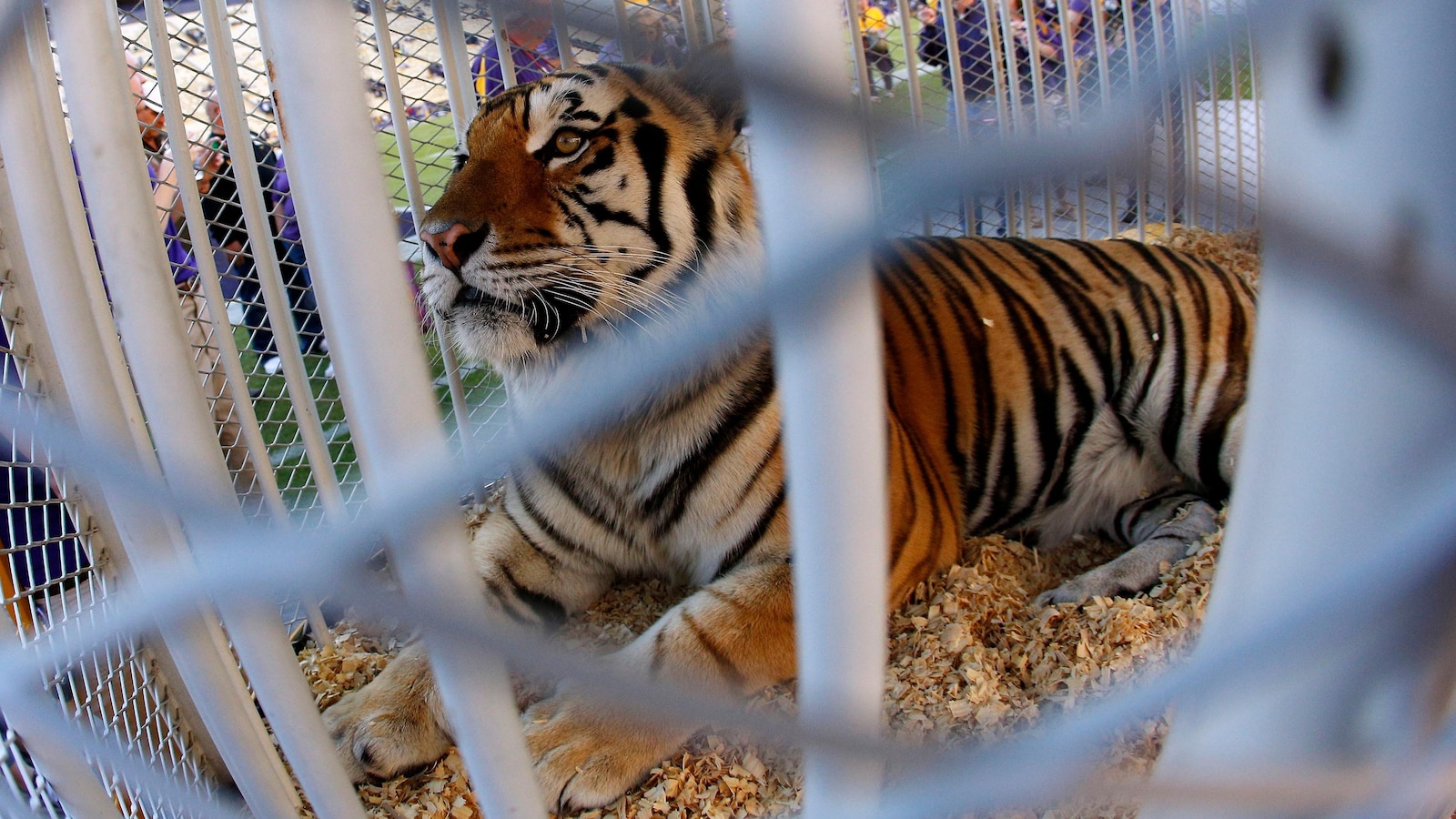
BATON ROUGE, La. — Gov. Jeff Landry confirmed his support on Tuesday of restarting the tradition of bringing Louisiana State University’s live tiger mascot onto the football field ahead of home games.
It has been nearly a decade since a Bengal Tiger has been rolled out in a cage under the lights of Death Valley, LSU’s famed Tiger Stadium in Baton Rouge where the school’s football team plays. University officials have not publicly said whether they are willing to revive the tradition, but that didn’t stop Landry from sharing his own opinion when asked by reporters.
“I think the opportunity to bring our mascot back onto that field is an unbelievable opportunity,” Landry said during an unrelated news conference on Tuesday.
People for the Ethical Treatment of Animals has vehemently objected to the idea. In early September, the organization sent a letter to Landry urging against the tradition, describing it as cruel and dangerous to the mascot’s welfare and adding that tigers are “naturally solitary animals who don’t belong in rowdy football stadiums.”
“Going back to the bad old days of using a wild animal as a sideline sideshow in 2024 is the last thing LSU should do, and PETA is appealing to Gov. Landry to drop this boneheaded idea,” the letter read.
On Tuesday, Landry said that “everybody that has some anxiety over this needs to calm down.”
The Associated Press emailed a spokesperson for LSU, the athletics department and the university’s School of Veterinary Medicine for a comment, but it did not receive an immediate response.
For years, the school’s live mascot would ride through the stadium in a travel trailer “topped by the LSU cheerleaders” before home games, based on information about the mascot on the LSU Athletics’ webpage. Before entering the stadium, the cage, with the tiger nicknamed Mike in it, would be parked next to the opponent’s locker room — forcing the visiting team to pass it.
Some of the live mascots even traveled with the team — brought to area games, the 1985 Sugar Bowl and the Superdome in New Orleans in 1991.
Following the death of the school’s tiger, Mike VI, in 2016, LSU announced that future Mike the Tigers would no longer be brought onto the field. According to the school’s website, Mike VI, who died from a rare form of cancer, had attended 33 of 58 home between 2007 and 2015.
While the university’s current live mascot, Mike VII — an 8-year-old and 345-pound tiger that was donated to the school from a sanctuary in 2017 — is not brought onto the field for games, visitors can still see the tiger in his 15,000-square-foot enclosure, which is on the campus and next to the stadium.
In the past, animal rights groups have called on LSU to stop keeping live tiger mascots. The school says it is providing a home to a tiger that needs one while also working to educate people about “irresponsible breeding and the plight of tigers kept illegally and/or inappropriately in captivity in the U.S.,” according to the athletics’ website.
Louisiana is not the only school that is home to a live mascot. Other examples include Yale University’s Handsome Dan, a bulldog; University of Texas at Austin’s Bevo the Longhorn, who appears on the field before football games; and University of Colorado’s Ralphie the Buffalo, who runs across the field with its handlers before kickoff.
Louisiana Governor John Bel Edwards recently made headlines when he endorsed the idea of reviving the tradition of having live tigers at LSU football games. The tradition, which dates back to the 1930s, was discontinued in 2017 due to concerns about the welfare of the tigers and the safety of the fans.
Governor Edwards believes that bringing back live tigers to LSU football games would not only enhance the gameday experience for fans, but also help to promote conservation efforts for the endangered species. He stated, “Having a live tiger at LSU football games is a longstanding tradition that adds to the excitement and energy of the game. It also serves as a powerful symbol of our commitment to preserving and protecting these magnificent animals.”
The LSU Tigers have long been associated with the majestic Bengal tiger, with the team’s mascot, Mike the Tiger, serving as a beloved symbol of school spirit and pride. The live tiger tradition was a unique and iconic aspect of LSU football games, with the tiger being paraded around the stadium before kickoff and serving as a source of inspiration for the team and fans alike.
However, concerns about the welfare of the tigers led to the decision to discontinue the tradition in 2017. Animal rights activists argued that keeping a live tiger in captivity for the purpose of entertainment was unethical and harmful to the animal’s well-being. In response to these concerns, LSU replaced the live tiger with a costumed mascot named “Mike VII.”
Despite these concerns, Governor Edwards believes that it is possible to bring back live tigers to LSU football games in a way that is ethical and responsible. He has proposed working with conservation organizations and wildlife experts to ensure that the tigers are well cared for and treated with respect.
In addition to enhancing the gameday experience for fans, bringing back live tigers to LSU football games could also help to raise awareness about the plight of endangered species like the Bengal tiger. By showcasing these magnificent animals in a positive and educational way, LSU could inspire fans to support conservation efforts and help protect these animals for future generations.
While there are still many logistical and ethical considerations to address before live tigers can return to LSU football games, Governor Edwards’ endorsement of the idea has sparked a renewed interest in reviving this iconic tradition. With careful planning and collaboration with conservation experts, it is possible that LSU could once again have live tigers roaming the sidelines at Tiger Stadium, adding an extra element of excitement and pride to gamedays for years to come.


